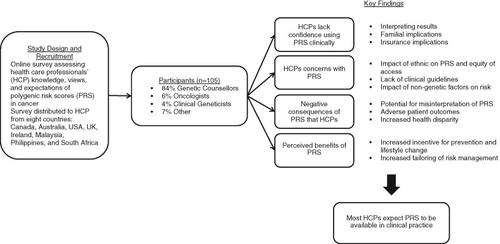当前位置:
X-MOL 学术
›
Clin. Genet.
›
论文详情
Our official English website, www.x-mol.net, welcomes your
feedback! (Note: you will need to create a separate account there.)
Knowledge, views and expectations for cancer polygenic risk testing in clinical practice: A cross-sectional survey of health professionals
Clinical Genetics ( IF 2.9 ) Pub Date : 2021-07-03 , DOI: 10.1111/cge.14025 Amelia K Smit 1, 2 , Ashleigh R Sharman 3 , David Espinoza 4 , Courtney Wallingford 5 , Mary-Anne Young 6 , Kate Dunlop 1 , Jane Tiller 7 , Ainsley J Newson 8 , Bettina Meiser 9 , Anne E Cust 1, 2 , Tatiane Yanes 5
Clinical Genetics ( IF 2.9 ) Pub Date : 2021-07-03 , DOI: 10.1111/cge.14025 Amelia K Smit 1, 2 , Ashleigh R Sharman 3 , David Espinoza 4 , Courtney Wallingford 5 , Mary-Anne Young 6 , Kate Dunlop 1 , Jane Tiller 7 , Ainsley J Newson 8 , Bettina Meiser 9 , Anne E Cust 1, 2 , Tatiane Yanes 5
Affiliation

|
Polygenic risk scores (PRS) are becoming increasingly available in clinical practice to evaluate cancer risk. However, little is known about health professionals' knowledge, attitudes, and expectations of PRS. An online questionnaire was distributed by relevant health professional organisations predominately in Australia, Canada and the US to evaluate health professionals' knowledge, views and expectations of PRS. Eligible participants were health professionals who provide cancer risk assessments. Results from the questionnaire were analysed descriptively and content analysis was undertaken of free-text responses. In total, 105 health professionals completed the questionnaire (genetic counsellors 84%; oncologists 6%; clinical geneticists 4%; other 7%). Although responses differed between countries, most participants (61%) had discussed PRS with patients, 20% had ordered a test and 14% had returned test results to a patient. Confidence and knowledge around interpreting PRS were low. Although 69% reported that polygenic testing will certainly or likely influence patient care in the future, most felt unprepared for this. If scaled up to the population, 49% expect that general practitioners would have a primary role in the provision of PRS, supported by genetic health professionals. These findings will inform the development of resources to support health professionals offering polygenic testing, currently and in the future.
中文翻译:

临床实践中癌症多基因风险检测的知识、观点和期望:卫生专业人员的横断面调查
多基因风险评分 (PRS) 在临床实践中越来越多地用于评估癌症风险。然而,关于卫生专业人员对 PRS 的知识、态度和期望知之甚少。主要在澳大利亚、加拿大和美国的相关卫生专业组织分发了一份在线问卷,以评估卫生专业人员对 PRS 的知识、观点和期望。符合条件的参与者是提供癌症风险评估的卫生专业人员。对问卷的结果进行了描述性分析,并对自由文本的回答进行了内容分析。总共有 105 名卫生专业人员完成了问卷调查(遗传咨询师 84%;肿瘤学家 6%;临床遗传学家 4%;其他 7%)。尽管各国的反应不同,大多数参与者 (61%) 曾与患者讨论过 PRS,20% 已订购测试,14% 已将测试结果返回给患者。关于解释 PRS 的信心和知识很低。尽管 69% 的人报告说多基因检测肯定或可能影响未来的患者护理,但大多数人对此感到毫无准备。如果扩大到人口规模,49% 的人预计全科医生将在遗传健康专业人员的支持下,在提供 PRS 方面发挥主要作用。这些发现将为资源开发提供信息,以支持当前和未来提供多基因检测的卫生专业人员。尽管 69% 的人报告说多基因检测肯定或可能影响未来的患者护理,但大多数人对此感到毫无准备。如果扩大到人口规模,49% 的人预计全科医生将在遗传健康专业人员的支持下,在提供 PRS 方面发挥主要作用。这些发现将为资源开发提供信息,以支持当前和未来提供多基因检测的卫生专业人员。尽管 69% 的人报告说多基因检测肯定或可能影响未来的患者护理,但大多数人对此感到毫无准备。如果扩大到人口规模,49% 的人预计全科医生将在遗传健康专业人员的支持下,在提供 PRS 方面发挥主要作用。这些发现将为资源开发提供信息,以支持当前和未来提供多基因检测的卫生专业人员。
更新日期:2021-09-03
中文翻译:

临床实践中癌症多基因风险检测的知识、观点和期望:卫生专业人员的横断面调查
多基因风险评分 (PRS) 在临床实践中越来越多地用于评估癌症风险。然而,关于卫生专业人员对 PRS 的知识、态度和期望知之甚少。主要在澳大利亚、加拿大和美国的相关卫生专业组织分发了一份在线问卷,以评估卫生专业人员对 PRS 的知识、观点和期望。符合条件的参与者是提供癌症风险评估的卫生专业人员。对问卷的结果进行了描述性分析,并对自由文本的回答进行了内容分析。总共有 105 名卫生专业人员完成了问卷调查(遗传咨询师 84%;肿瘤学家 6%;临床遗传学家 4%;其他 7%)。尽管各国的反应不同,大多数参与者 (61%) 曾与患者讨论过 PRS,20% 已订购测试,14% 已将测试结果返回给患者。关于解释 PRS 的信心和知识很低。尽管 69% 的人报告说多基因检测肯定或可能影响未来的患者护理,但大多数人对此感到毫无准备。如果扩大到人口规模,49% 的人预计全科医生将在遗传健康专业人员的支持下,在提供 PRS 方面发挥主要作用。这些发现将为资源开发提供信息,以支持当前和未来提供多基因检测的卫生专业人员。尽管 69% 的人报告说多基因检测肯定或可能影响未来的患者护理,但大多数人对此感到毫无准备。如果扩大到人口规模,49% 的人预计全科医生将在遗传健康专业人员的支持下,在提供 PRS 方面发挥主要作用。这些发现将为资源开发提供信息,以支持当前和未来提供多基因检测的卫生专业人员。尽管 69% 的人报告说多基因检测肯定或可能影响未来的患者护理,但大多数人对此感到毫无准备。如果扩大到人口规模,49% 的人预计全科医生将在遗传健康专业人员的支持下,在提供 PRS 方面发挥主要作用。这些发现将为资源开发提供信息,以支持当前和未来提供多基因检测的卫生专业人员。











































 京公网安备 11010802027423号
京公网安备 11010802027423号